ACM MemberNet - Summer 2024

THE 2024 ACM AWARDS BANQUET
- ACM A.M. Turing Award
- ACM Prize in Computing
- ACM Frances E. Allen Award
- ACM - AAAI Allen Newell Award
- Software System Award
- Grace Murray Hopper Award
- Paris Kanellakis Theory and Practice Award
- Policy Award
- Karl V. Karlstrom Outstanding Educator Award
- Distinguished Service Award
- Outstanding Contribution to ACM Award
- Athena Lecturer Award
- Doctoral Dissertation Award
- Presidential Award
- 2023 ACM Fellows
ACM AWARD NOMINATIONS
ACM ADVANCED MEMBER GRADES
TOP STORIES
- ACM Announces New Award Recognizing Contributions From Underrepresented Communities
- 11th Heidelberg Laureate Forum
- ACM Boasts Strong Impact Factor Performance
PUBLIC POLICY
PUBLISHING NEWS
- acmqueue: "Trustworthy AI using Confidential Federated Learning"
- ACM Journals Inaugural Issues
- Journals Calling for Editor-in-Chief Nominations
- ACM Open: Couperin Consortium
SIG NEWS & AWARDS
- 2024 Gödel Prize Recipient Announced
- 2024 ACM SIGecom Test of Time Award Announced
- SIGMOD Award Recipients From MODPODS ’24
- SIGPLAN Announces Recent Award Recipients
- Best Paper Awards Given at Recent ACM SIG Conferences
DIVERSITY, EQUITY, & INCLUSION
- Celebrating Technology Leaders - Generative AI in Enterprise Software
- Accessibility in Computing: Trends, Challenges and Opportunities
- How Tech Can Empower the LGBTQ+ Community
MEMBERSHIP
LEARNING PROGRAMS
STUDENT NEWS
CHAPTERS NEWS
DISTINGUISHED SPEAKERS PROGRAM
SOCIAL MEDIA
ACM CAREER & JOB CENTER
THE 2024 ACM AWARDS BANQUET
The ACM Awards Banquet is an annual event recognizing technical excellence and outstanding service to the computing field. This year's banquet honoring the 2023 award recipients and newly inducted ACM Fellows was held at the Palace Hotel in San Francisco on June 22.
ACM's awards celebrate our long tradition of honoring those whose contributions have impacted our world for the better in countless ways. These prestigious and internationally recognized honors are an integral part of ACM's mission to unite computing educators, researchers, and professionals to inspire dialogue, share resources, and address the field's challenges.
View our photo album of the banquet here.
View our awards video playlist here, highlighting the 2023 award recipients' work, research, and contributions to the field of computing.
ACM A.M. Turing Award
The ACM A.M. Turing Award was presented to Avi Wigderson for foundational contributions to the theory of computation, including reshaping our understanding of the role of randomness in computation and mathematics, and for his decades of intellectual leadership in theoretical computer science. Wigderson has also made far-reaching contributions to the theory of computational complexity and cryptography.
Learn more in this short video.
Wigderson delivered his Turing Award Lecture "Alan Turing: A TCS Role Model," at STOC 2024: ACM Symposium on Theory of Computing, which can be viewed here.
Accompanied by a prize of $1,000,000, ACM's most prestigious award is given to recognize contributions of a technical nature which are of lasting and major technical importance to the computing field. Financial support for the A.M. Turing Award is provided by Google Inc.
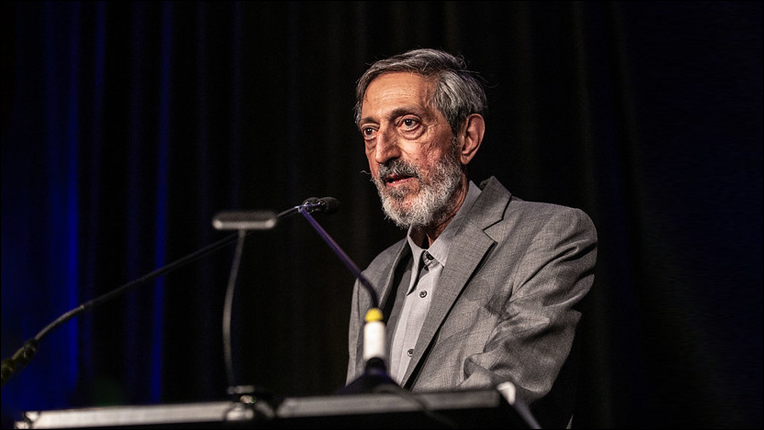
ACM A.M. Turing Award recipient Avi Wigderson
ACM Prize in Computing
The ACM Prize in Computing was presented to Amanda Randles for Ground-breaking contributions to computational health through innovative algorithms, tools, and high-performance computing methods for diagnosing and treating a variety of human diseases. She is known for developing new computational tools to harness the world’s most powerful supercomputers to create highly precise simulations of biophysical processes.
Learn more in this short video.
The ACM Prize in Computing recognizes an early- to mid-career fundamental innovative contribution in computing that, through its depth, impact, and broad implications, exemplifies the greatest achievements in the discipline. The award carries a prize of $250,000. Financial support is provided by Infosys Ltd.
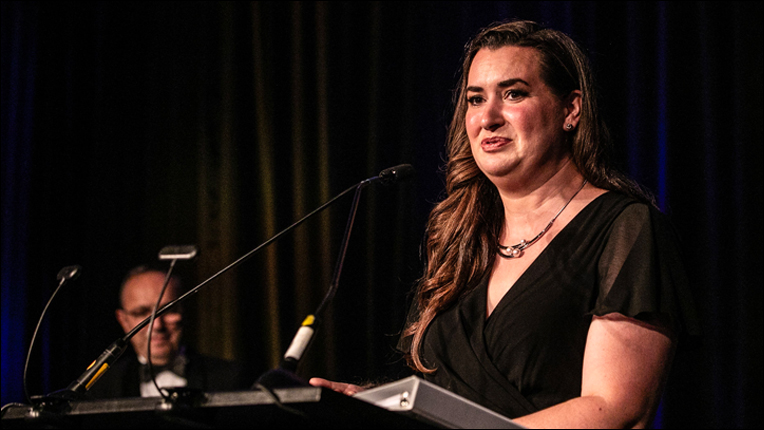
ACM Prize recipient Amanda Randles
ACM Frances E. Allen Award
The ACM Frances E. Allen Award for Outstanding Mentoring was presented to Margaret Martonosi for outstanding and far-reaching mentoring at Princeton University, in computer architecture, and to the broader computer science community. Martonosi, the Hugh Trumbull Adams ’35 Professor of Computer Science at Princeton University, is a leader in the design, modeling, and verification of power efficient computer architecture. She also recently served as the National Science Foundation Assistant Director leading the Directorate for Computer and Information Science and Engineering.
Learn more in this short video.
Presented biennially to an individual who has exemplified excellence and/or innovation in mentoring with particular attention to recognition of individuals who have shown outstanding leadership in promoting diversity, equity, and inclusion in computing. The award is presented at the ACM Award Banquet and is accompanied by a prize of $25,000 to the awardee, and an additional $10,000 cash contribution to an approved charity of the awardee’s choice. Financial support is provided by Microsoft Research.
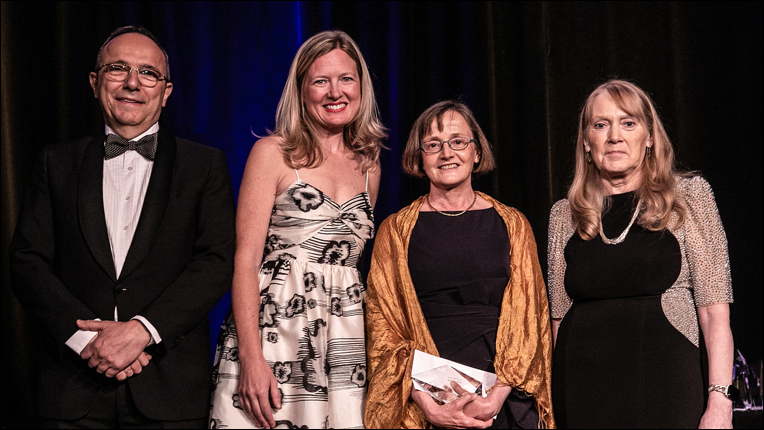
Yannis Ioannidis, Microsoft Distinguished Engineer and Vice President Krysta Svore, ACM Frances E. Allen Award recipient Margaret Martonosi, and Vicki L. Hanson
ACM - AAAI Allen Newell Award
The ACM - AAAI Allen Newell Award was presented to David Blei for significant contributions to machine learning, information retrieval, and statistics. His signature accomplishment is in the machine learning area of “topic modeling,” which he pioneered in the foundational paper “Latent Dirichlet Allocation” (LDA). The applications of topic modeling can be found throughout the social, physical, and biological sciences, in areas such as medicine, finance, political science, commerce, and the digital humanities.
Learn more in this short video.
The award is named for Allen Newell, a trailblazer in computer science research and education, and a founder of the artificial intelligence and cognitive science fields. The Newell Award is presented to individuals selected for career contributions that have breadth within computer science, or that bridge computer science and other disciplines. It is accompanied by a $10,000 prize provided by ACM and the Association for the Advancement of Artificial Intelligence, and by individual contributions.
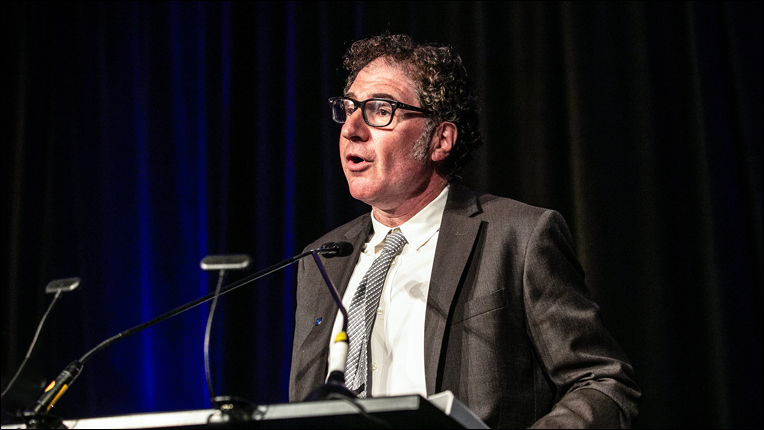
ACM-AAAI Allen Newell Award recipient David Blei
Software System Award
The Software System Award was presented to Andrew S. Tanenbaum for MINIX, which influenced the teaching of Operating Systems principles to multiple generations of students and contributed to the design of widely used operating systems, including Linux. MINIX was a small microkernel-based UNIX operating system for the IBM PC, which was popular at the time. It was roughly 12,000 lines of code, and in addition to the microkernel, included a memory manager, file system and core UNIX utility programs.
Learn more in this short video.
The Software System Award is presented to an institution or individuals recognized for developing a software system that has had a lasting influence, reflected in contributions to concepts, in commercial acceptance, or both. A prize of $35,000 accompanies the award, with financial support provided by IBM.
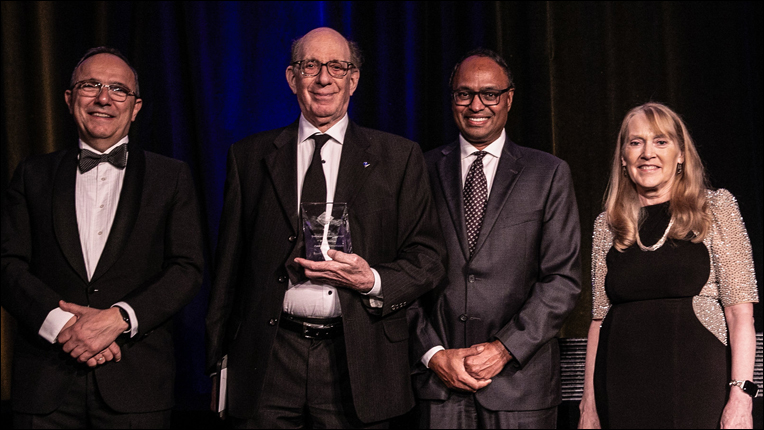
Yannis Ioannidis, Software System Award recipient Andrew S. Tanenbaum, IBM Director & Distinguished Engineer Sandeep Gopisetty, and Vicki L. Hanson
Grace Murray Hopper Award
The Grace Murray Hopper Award was presented to Prateek Mittal, for foundational contributions to safeguarding Internet privacy and security using a cross-layer approach. The unifying theme in Mittal’s research is to leverage foundational techniques from network science, comprising graph-theoretical mechanics, data mining, and inferential modeling for tackling privacy and security challenges. Taken together, his contributions are impacting the privacy and integrity of global commerce, financial services, online healthcare, and everyday communications.
Learn more in this short video.
The award is named for Admiral Grace Murray Hopper, a pioneer in software development whose work spanned programming languages, software development concepts, compiler validation, and data processing. The Hopper Award is presented to the outstanding young computer professional of the year, selected on the basis of a single recent major technical or service contribution. The candidate must have been 35 years of age or less at the time the qualifying contribution was made. A prize of $35,000 accompanies the award, with financial support provided by Microsoft Research.
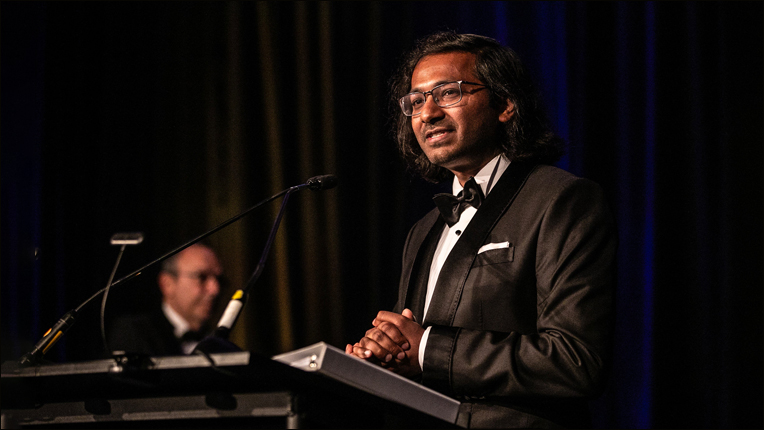
Hopper Award recipient Prateek Mittal
Paris Kanellakis Theory and Practice Award
The Paris Kanellakis Theory and Practice Award was presented to Guy E. Blelloch, Carnegie Mellon University; Laxman Dhulipala, University of Maryland; and Julian Shun, Massachusetts Institute of Technology, for contributions to algorithm engineering, including the Ligra, GBBS, and Aspen frameworks which revolutionized large-scale graph processing on shared-memory machines. They have obtained many truly outstanding results in which their provably efficient algorithms running on an inexpensive multi-core shared-memory machine are faster than any prior algorithms, even those running on much bigger and more expensive machines.
Learn more in this short video.
The award is named for Paris Christos Kanellakis, who, as a distinguished computer science theoretician and esteemed faculty member of Brown University, focused much of his work in the area of theoretical computer science, particularly the principles of database systems and logic. The Kanellakis Award honors specific theoretical accomplishments that have had a significant and demonstrable effect on the practice of computing. It is accompanied by a prize of $10,000 and is endowed by contributions from the Kanellakis family, and financial support by ACM's Special Interest Groups SIGACT, SIGDA, SIGMOD, and SIGPLAN, the ACM SIG Project Fund, and individual contributions.
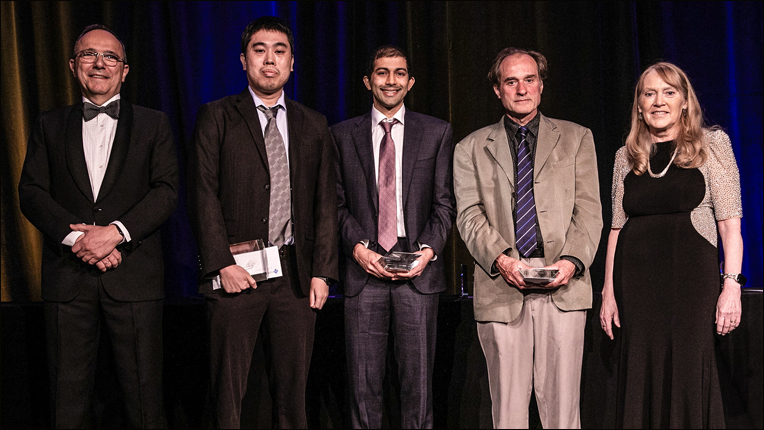
Yannis Ioannidis, Kanellakis Award recipients Julian Shun, Laxman Dhulipala, Guy E. Blelloch, and Vicki L. Hanson
ACM Policy Award
The ACM Policy Award was presented to John M. Abowd for transformative work in modernizing the US Census Bureau’s processing and dissemination of census and survey data, which serves as a model for privacy-aware management of government collected data. Abowd’s work has transformed the government’s capacity to improve the accuracy and availability of vital statistical and data resources, while at the same time, enhancing citizens’ privacy.
Learn more in this short video.
The ACM Policy Award was established in 2014 to recognize an individual or small group that had a significant positive impact on the formation or execution of public policy affecting computing or the computing community. This can be for education, service, or leadership in a technology position; for establishing an innovative program in policy education or advice; for building the community or community resources in technology policy; or other notable policy activity. The award is accompanied by a $10,000 prize.
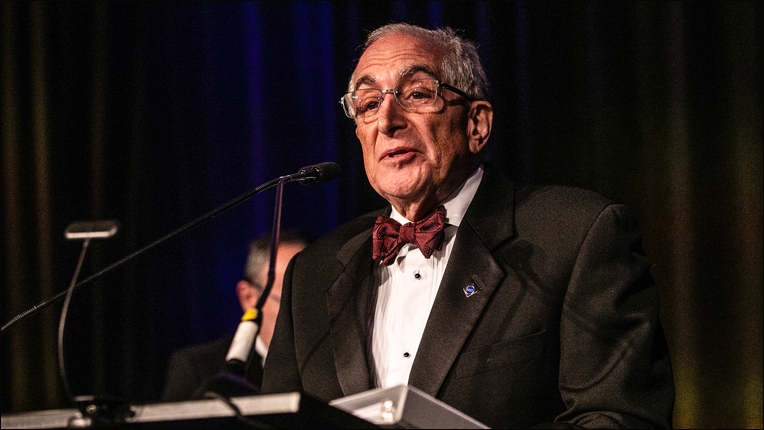
ACM Policy Award recipient John M. Abowd
Karl V. Karlstrom Outstanding Educator Award
The Karl V. Karlstrom Outstanding Educator Award was presented to Alicia Nicki Washington and Shaundra Daily for their work towards changing the national computing education system to be more equitable and to combat unjust impacts of computing on society. Washington and Daily have had a critical, wide-reaching impact on educating the broader community through a novel course, a popular training program, and a national alliance.
Learn more in this short video.
The Karlstrom Award is presented annually to an outstanding educator who is appointed to a recognized educational baccalaureate institution; recognized for advancing new teaching methodologies; effecting new curriculum development or expansion in computer science and engineering; or making a significant contribution to ACM's educational mission. Those teachers with 10 years or less experience are given special consideration. The Karlstrom Award is accompanied by a prize of $10,000, with financial support provided by ACM.
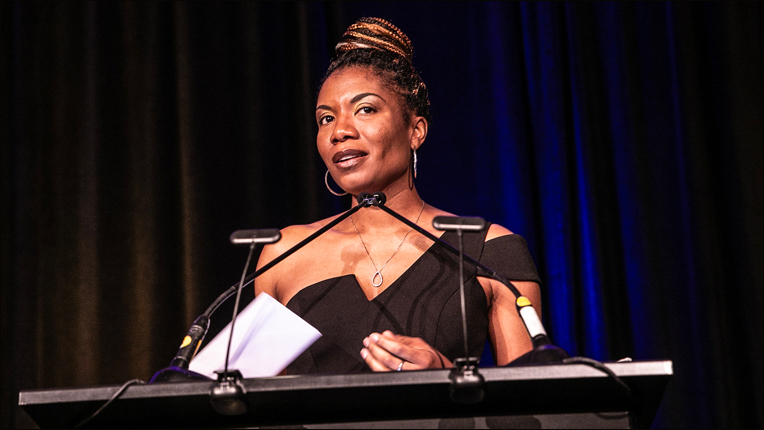
Karlstrom Award recipient Alicia Nicki Washington
Distinguished Service Award
The Distinguished Service Award was presented to Aidong Zhang, Thomas M. Linville Professor, University of Virginia, for her impactful leadership and lasting service to the broad communities of bioinformatics, computational biology, and data mining. As an ACM member for 29 years, Zhang has devoted tremendous efforts to serving her research community.
Learn more in this short video.
The Distinguished Service Award is given on the basis of value and degree of service to the computing community. The contributions are not limited to service to the Association and should include activities in other computer organizations and should emphasize contributions to the computing community at large.
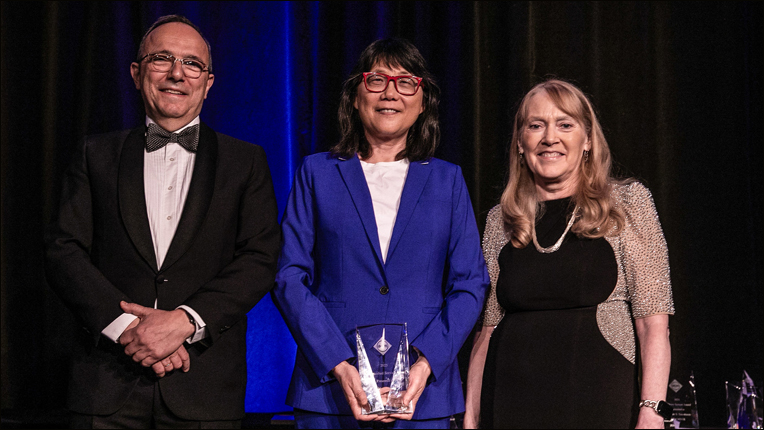
Yannis Ioannidis, Distinguished Service Award recipient Aidong Zhang, and Vicki L. Hanson
Outstanding Contribution to ACM Award
The Outstanding Contribution to ACM Award was presented to Jack W. Davidson for leadership in and contributions to ACM’s Publications Program. Davidson served as Co-Chair of the ACM Publications Board from 2010 through 2021 and has been the founding chair of the ACM Digital Library Board since 2021. In those roles, he has led several key efforts of paramount importance to ACM, its membership, and the computing community.
Learn more in this short video.
The Outstanding Contribution to ACM Award recognizes outstanding service contributions to the Association. Candidates are selected based on the value and degree of service overall and may be given to up to three individuals each year.
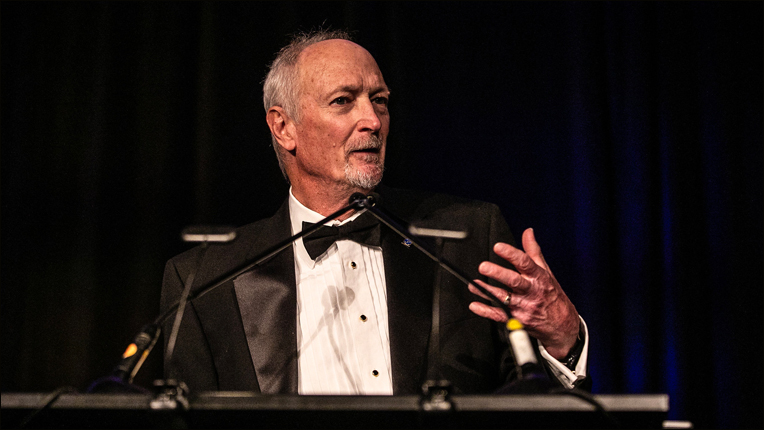
Outstanding Contribution to ACM Award recipient Jack W. Davidson
ACM Athena Lecturer Award
The ACM Athena Lecturer Award was presented to Maja Matarić for pioneering the field of socially assistive robotics, including groundbreaking research, evaluation, and technology transfer, and foundational work in multi-robot coordination and human-robot interaction. Matarić is also the founding director of the USC Robotics and Autonomous Systems Center, and a Principal Scientist at Google DeepMind.
Learn more in this short video.
The ACM Athena Lecturer Award recognition celebrates women researchers who have made fundamental contributions to computer science. The award carries a cash prize of $25,000, with financial support provided by Two Sigma. The recipient gives an invited talk at a major ACM conference of her choice.
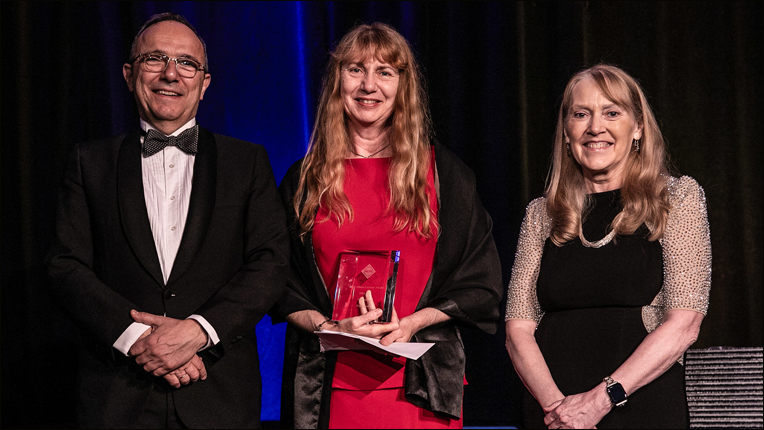
Yannis Ioannidis, Athena Lecturer Award recipient Maja Matarić, and Vicki L. Hanson
Doctoral Dissertation Award
The Doctoral Dissertation Award was presented to Nivedita Arora is the recipient of the ACM Doctoral Dissertation Award for demonstrating wireless and batteryless sensor nodes using novel materials and radio backscatter in her dissertation “Sustainable Interactive Wireless Stickers: From Materials to Devices to Applications.”
Honorable Mentions for the ACM Doctoral Dissertation Award go to: Gabriele Farina, whose PhD was earned at Carnegie Mellon University, for his dissertation “Game-Theoretic Decision Making in Imperfect-Information Games;” and William Kuszmaul, whose PhD was earned at MIT, for his dissertation “Randomized Data Structures: New Perspectives and Hidden Surprises.”
The Doctoral Dissertation Award is presented annually to the author(s) of the best doctoral dissertation(s) in computer science and engineering. The award is accompanied by a prize of $20,000 and the honorable mention is accompanied by a prize totaling $10,000. Winning dissertations will be published in the ACM Digital Library as part of the ACM Books Series.
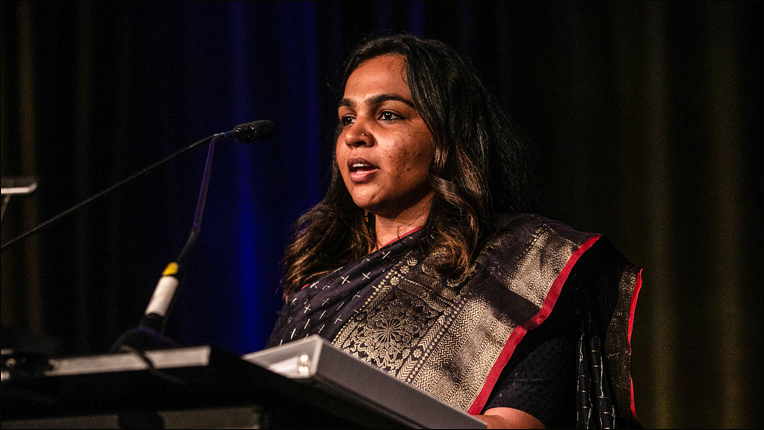
Doctoral Dissertation Award recipient Nivedita Arora
Presidential Award
ACM President Yannis Ioannidis recognized Anand Deshpande, Managing Director, Persistent Systems, and M. Tamer Özsu, Professor, University of Waterloo, with the ACM Presidential Award for long-standing contributions to the broader computing community and to ACM.
Deshpande has been a major asset of the computing ecosystem of India, having a tangible, technological, economic, and intellectual impact in his country. He has made significant contributions to the local innovation and educational environments through think tanks and professional support foundations, but has also contributed to technology policy issues, advising the Indian government on critical topics.
Learn more in this short video.
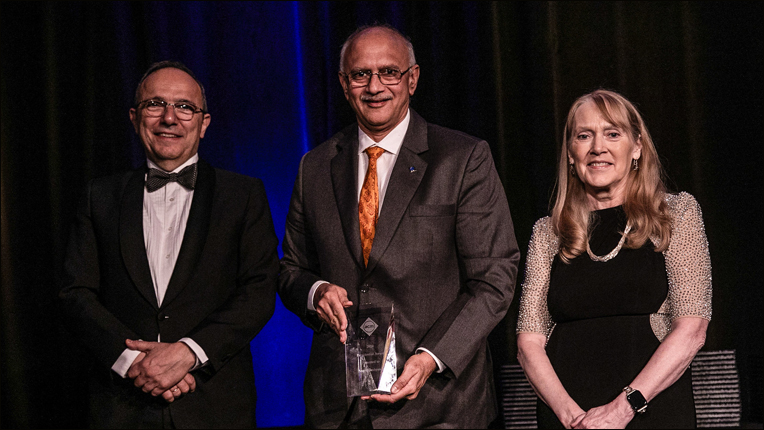
Yannis Ioannidis, Presidential Award recipient Anand Deshpande, and Vicki L. Hanson
Özsu is known for his research work on large-scale distributed data management and his emphasis on system building targeting grand societal challenges. In addition, Özsu has truly dedicated himself to the education of the younger generation, nurturing and inspiring young researchers and practitioners.
Learn more in this short video.
This award is given at the discretion of the ACM President, to individuals whose contributions in computing fall within the goals of the ACM.
2023 ACM Fellows
The ACM Fellows Program was established in 1993 to recognize and honor outstanding ACM members for their achievements in computer science and information technology and for their significant contributions to the mission of ACM. The ACM Fellows serve as distinguished colleagues to whom ACM and its members look for guidance and leadership as the world of information technology evolves.
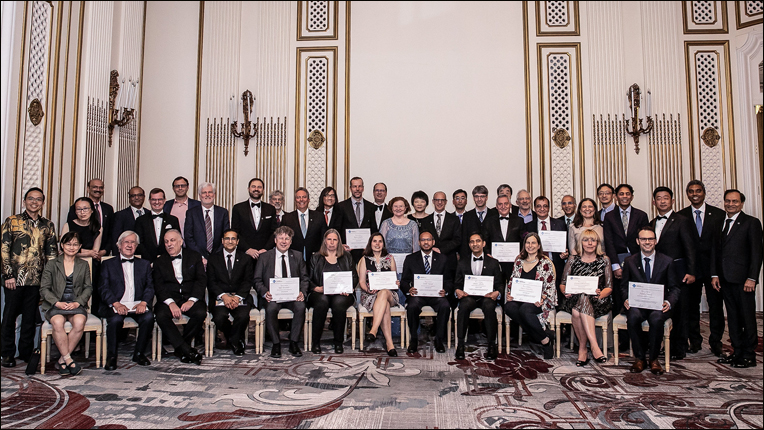
The 2023 ACM Fellows
The 2023 Fellows are:
- Aditya Akella, University of Texas
- Michael Backes, CISPA
- Vineet Bafna, University of California, San Diego
- Maria-Florina Balcan, Carnegie Mellon University
- Nikhil Bansal, University of Michigan
- Mikhail Belkin, University of California, San Diego
- Yoshua Bengio, Mila, Université de Montréal
- Shai Ben-David, University of Waterloo
- Tim Berners-Lee, WWW Consortium
- Vaughn Timothy Betz, University of Toronto
- Ramon Caceres, Google
- Chandra Chekuri, University of Illinois, Urbana-Champaign
- Haibo Chen, Shanghai Jiao Tong University
- Yingying (Jennifer) Chen, Rutgers University
- Kenneth Ward Church, EAI, Northeastern University
- Roger B. Dannenberg, Carnegie Mellon University
- Xin Luna Dong, Meta
- Rolf Drechsler, University of Bremen
- Wenliang Du, Syracuse University
- Pradeep Dubey, Intel Corporation
- Anja Feldmann, Max Planck Institute and TU Berlin
- George Fitzmaurice, Autodesk Canada, Inc.
- Fedor Fomin, University of Bergen
- Jeffrey S. Foster, Tufts University
- Jianfeng Gao, Microsoft
- Ian Goldberg, University of Waterloo
- Sumit Gulwani, Microsoft
- Zhu Han, University of Houston
- Geoffrey Hinton, University of Toronto
- Nicole Immorlica, Microsoft Research
- Trent Jaeger, Pennsylvania State University
- Kenneth Richard Koedinger, Carnegie Mellon University
- Andreas Krause, ETH Zurich
- Christopher Ian Kruegel, University of California Santa Barbara
- H.T. Kung, Harvard University
- Yann LeCun, New York University
- David Lo, Singapore Management University
- Wenjing Lou, Virginia Tech
- Kwan-Liu Ma, University of California, Davis
- Wei-Ying Ma, Tsinghua University
- Z. Morley Mao, University of Michigan
- Deborah McGuinness, Rensselaer Polytechnic Institute
- Gerard G. Medioni, Amazon
- Sharad Mehrotra, University of California, Irvine
- Seffi Naor, Technion—Israel Institute of Technology
- Shrikanth Narayanan, University of Southern California
- Natasha Noy, Google Research
- Corina S. Pasareanu, NASA Ames and Carnegie Mellon University
- Massoud Pedram, University of Southern California
- Anand Raghunathan, Purdue University
- Benjamin Raphael, Princeton University
- Dana Ron, Tel Aviv University
- Tim Roughgarden, Columbia University
- David Sankoff, University of Ottawa
- Stefan Saroiu, Microsoft
- Albrecht Schmidt, Ludwig Maximilian University of Munich
- Björn W. Schuller, Imperial College London, Technical University of Munich
- Phoebe Sengers, Cornell University
- Elaine Shi, Carnegie Mellon University
- Noah Snavely, Cornell Tech, Google
- Ram D. Sriram, NIST
- Steffen Staab, University of Stuttgart, University of Southampton
- Alexander Szalay, The Johns Hopkins University
- Manik Varma, Microsoft Research India
- XiaoFeng Wang, Indiana University at Bloomington
- Kilian Weinberger, Cornell University
- Emmett Witchel, The University of Texas at Austin
- Xing Xie, Microsoft Research Asia
View the complete listing of ACM Fellows.
ACM AWARD NOMINATIONS
Call for ACM Award Nominations
Each year, ACM recognizes technical and professional achievements within the computing and information technology community through its celebrated Awards Program. ACM welcomes nominations for candidates whose work exemplifies the best and most influential contributions to our community, and society at large.
ACM seeks your help in expanding and diversifying the nomination pool for our ACM Awards. It is often the case that people wonder why a specific person who seems highly deserving has not received an ACM award. The common answer is that the person was never nominated.
Please take a moment to consider those people in your community who may be suitable for nomination. Refer to the award nominations page for links to individual award pages, where you will find nomination requirements, deadlines, and Award Subcommittee Members. Keep in mind ACM's commitment to diversity, equity, and inclusion when nominating. While candidates for advanced member grades (Fellow or Distinguished Member) must be ACM members, candidates for ACM Awards do not need to be members to be nominated. Nominations for most awards are due December 15, 2024.
ACM ADVANCED MEMBER GRADES
Advanced Member Grade Nomination Information
Fellow is ACM's most prestigious member grade recognizing the top 1% of ACM members for their outstanding accomplishments in computing and information technology and/or outstanding service to ACM and the larger computing community. The deadline for nominations is September 7, 2024.
The Senior Member advanced grade of membership recognizes ACM members with at least 10 years of professional experience and 5 years of continuous ACM Professional membership. Nominations are accepted on a quarterly basis. The deadline for nominations is September 3, 2024.
TOP STORIES
ACM Announces New Award Recognizing Contributions From Underrepresented Communities
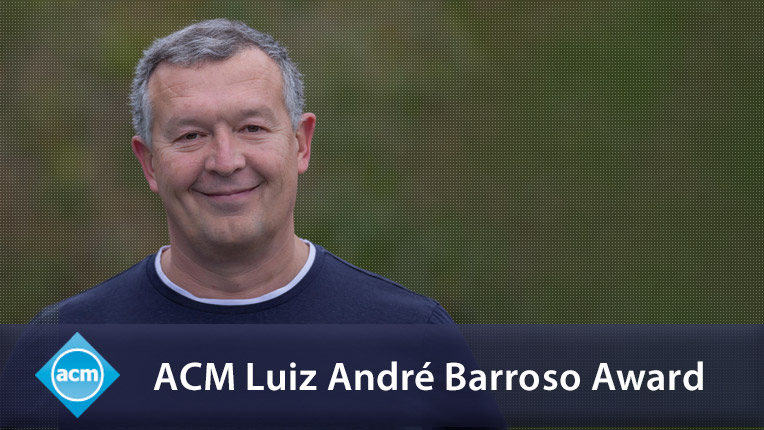
ACM has established a new award named for Luiz André Barroso. This award will be presented annually, and celebrates researchers from historically underrepresented communities across the world who have made fundamental contributions to computer science. The recipient of the award will give a one-hour invited talk at a major ACM conference of their choice. The award carries a cash prize of $40,000 and includes travel expenses to the conference, plus an additional $10,000 cash contribution to an approved charity of the awardee’s choice. Nomination information for the ACM Luiz André Barroso Award can be found here. Financial support for the Luiz André Barroso Award is provided by Google.
11th Heidelberg Laureate Forum
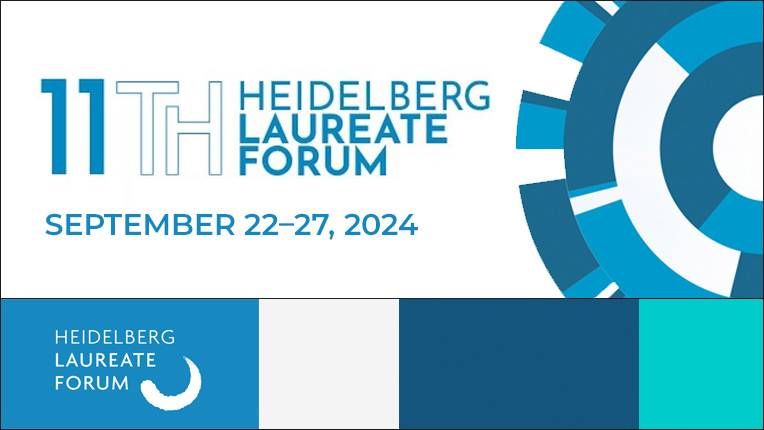
The 11th Heidelberg Laureate Forum will offer young researchers and other participants the opportunity to connect with scientific pioneers and learn how the laureates made it to the top of their fields as some of the brightest minds in mathematics and computer science come together for an unrestrained, interdisciplinary exchange. Notable participants this year include 19 ACM Award recipients including ACM A.M. Turing Award recipients Jack Dongarra, Vinton Cerf, Whitfield Diffie, Shafrira Goldwasser, and Martin Hellman, as well as ACM Prize in Computing recipients Yael Tauman Kalai, Alexei Efros, and David M. Blei, among many others.
While the 11th HLF is being held at its traditional home in Heidelberg, Germany, sessions will also be livestreamed on the HLF website.
ACM Boasts Strong Impact Factor Performance
The publications of ACM once again had an impressive showing in the newest Journal Citation Reports (JCR) from Clarivate Analytics. Standout journal ACM Computing Surveys (CSUR) continued its impressive ascent, receiving an impact factor of 23.8, up from 16.6 the year before, and placing it first out of the 143 journals in the Computer Science, Theory & Methods category. Flagship journal Communications of the ACM (CACM) boasted continued strong performance, with an impact factor of 11.1, placing it first in the Computer Science, Hardware & Architecture category for the second year in a row; third of 131 titles in the Computer Science, Software Engineering category; and sixth of 143 journals in the Computer Science, Theory & Methods category.
PUBLIC POLICY
TechBrief: Data Privacy Protection
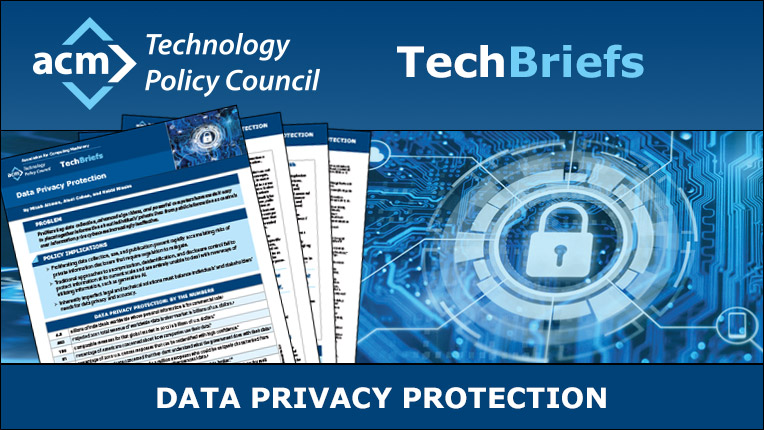
ACM TechBriefs is a series of short technical bulletins by ACM’s Technology Policy Council that present scientifically grounded perspectives on the impact of specific developments or applications of technology. The latest, “TechBrief: Data Privacy Protection” concerns the proliferation of data collection, advanced algorithms, and powerful computers which have made it easy to piece together information about individuals’ private lives from public information—even as controls over information privacy become increasingly ineffective.
USTPC Releases Statement on Digital Accessibility
The Association for Computing Machinery’s US Technology Policy Committee (USTPC) has released a Statement in Support of Mandatory Comprehensive Digital Accessibility Regulations. The US Department of Justice recently updated the Americans with Disabilities Act (ADA), a civil rights law that prohibits discrimination based on disability, with requirements for the accessibility of web content and mobile applications. The aim of the revision to the ADA is to ensure that services, programs, and activities provided by state and local governments online and through mobile apps are accessible to people with disabilities.
PUBLISHING NEWS
acmqueue: "Trustworthy AI using Confidential Federated Learning"
Classic federated learning was designed with a strong emphasis on security and privacy, at the cost of transparency and accountability. Confidential federated learning addresses this gap with a careful combination of FL with TEEs and commitments.
ACM Journals Inaugural Issues
The inaugural issue of Proceedings of the ACM on Software Engineering (PACMSE) is now available for download. PACMSE is a premier Gold Open Access journal that publishes top-quality, original research on all aspects of software engineering, from requirements elicitation to quality assessment and from design to maintenance, evolution, and deployment. PACMSE covers a broad range of topics and methods that help conceive, create, and maintain better software, be it embedded, cloud-based, mobile and ubiquitous, or on conventional computers. The journal welcomes contributions on new methodologies, tools, theories, and models, as well as empirical studies and survey papers related to the wide spectrum of software engineering topics.
Journals Calling for Editor-in-Chief Nominations
ACM Transactions on Internet Technology (TOIT) is seeking a new Editor-in-Chief. Nominations, including self-nominations, are invited for a three-year term beginning on December 1, 2024. The EIC appointment may be renewed at most one time. This is a voluntary position, but ACM will provide appropriate administrative support. The deadline for submitting nominations is September 27, although nominations will continue to be accepted until the position is filled. For more information, visit the TOIT call page.
ACM Transactions on Parallel Computing (TOPC) is seeking a new Editor-in-Chief. TOPC is a forum for novel and innovative work on all aspects of parallel computing, including foundational and theoretical aspects, systems, languages, architectures, tools, and applications. Nominations, including self-nominations, are invited for a three-year term beginning on November 1, 2024. The deadline for submitting nominations is September 30. For more information, visit the TOPC call page.
ACM Open: Couperin Consortium
We are pleased to announce that Couperin Consortium has signed on to ACM Open. This deal covers 31 academic institutions in France including the Institut National de Recherche en Informatique et en Automatique (INRIA), Sorbonne Universite, and Universite Paris-Saclay. If your university has yet to join, please reach out to your Department Head or Librarian or contact us. A list of ACM Open participating institutions, including those that recently joined, is available here.
SIG NEWS & AWARDS
2024 Gödel Prize Recipient Announced
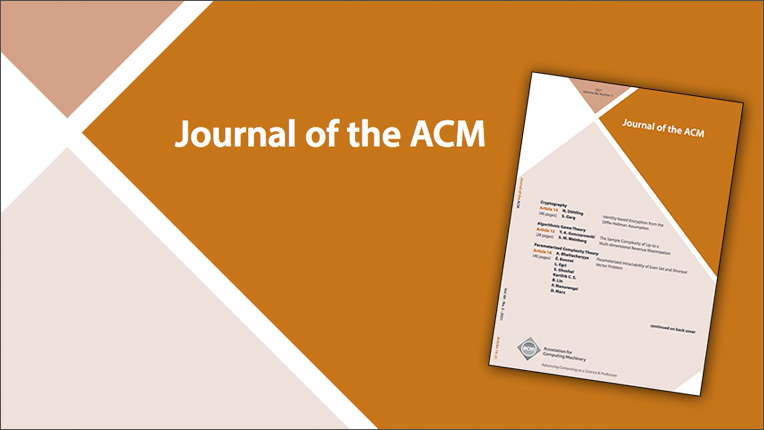
ACM’s Special Interest Group on Algorithms and Computation Theory (SIGACT) and the European Association for Theoretical Computer Science (EATCS) have named Ryan Williams as the recipient of the 2024 Gödel Prize for the paper "Non-Uniform ACC Circuit Lower Bounds," published in Journal of the ACM (JACM). Ryan's "algorithms to lower bounds" paradigm pioneered in the awarded paper opened the door to a rich two-way connection between algorithmic techniques and lower bound techniques.
2024 ACM SIGecom Test of Time Award Announced
Another paper published in JACM recently has received the 2024 ACM SIGecom Test of Time Award—"AdWords and Generalized Online Matching" by Aranyak Mehta, Amin Saberi, Umesh Vazirani, and Vijay Vazirani. The paper was recognized for introducing and solving a model of online matching with budgets that has seen many practical applications to online markets and broad and continuing impact in the literature.
SIGMOD Award Recipients From MODPODS ’24
The ACM Special Interest Group on Management of Data (SIGMOD) is concerned with the principles, techniques and applications of database management systems and data management technology, with several awards and competitions. The most recent award recipients from the MODPODS ’24 conference in June can be found here.
SIGPLAN Announces Recent Award Recipients
The ACM Special Interest Group on Programming Languages (SIGPLAN) explores programming language concepts and tools, focusing on design, implementation, practice, and theory. SIGPLAN has announced several award recipients for 2024 here.
Best Paper Awards Given at Recent ACM SIG Conferences
ACM's Special Interest Groups (SIGs) regularly cite outstanding individuals for their contributions in 38 distinct technological fields. Some awards presented (or to be presented) at conferences:
- SIGCOMM '24: ACM SIGCOMM 2024 Conference
- SIGIR '24: The 47th International ACM SIGIR Conference on Research and Development in Information Retrieval
- Internetware '24: 15th Asia-Pacific Symposium on Internetware
- PEARC '24: Practice and Experience in Advanced Research Computing
- ITiCSE '24: Innovation and Technology in Computer Science Education
- CODASPY '24: 14th ACM Conference on Data and Application Security and Privacy
- CUI '24: ACM Conversational User Interfaces 2024
- STOC '24: 56th Annual ACM Symposium on Theory of Computing
- HotStorage '24: 16th ACM Workshop on Hot Topics in Storage and File Systems
- UMAP '24: 32nd ACM Conference on User Modeling, Adaptation and Personalization
- DIS '24: ACM Designing Interactive Systems Conference
- EICS '24: The 16th ACM SIGCHI Symposium on Engineering Interactive Computing Systems
- SACMAT '24: The 29th ACM Symposium on Access Control Models and Technologies
- CHIWORK '24: Annual Symposium on Human-Computer Interaction for Work
- ICMR '24: International Conference on Multimedia Retrieval
- IDC '24: The 23rd Annual ACM Interaction Design and Children Conference
- IH&MMSEC '24: ACM Workshop on Information Hiding and Multimedia Security
- GLSVLSI '24: Great Lakes Symposium on VLSI 2024
- IMX '24: ACM International Conference on Interactive Media Experiences
- SIGMETRICS/PERFORMANCE '24: ACM SIGMETRICS/IFIP PERFORMANCE Joint International Conference on Measurement and Modeling of Computer Systems
- SIGMOD/PODS '24: International Conference on Management of Data
- e-Energy '24: The 15th ACM International Conference on Future and Sustainable Energy Systems
- ETRA '24: The 2024 Symposium on Eye Tracking Research and Applications
- ICS '24: 2024 International Conference on Supercomputing
- SBSI '24: The 20th Brazilian Symposium on Information Systems
- I3D '24: Conference Symposium on Interactive 3D Graphics and Games
- SAC '24: The 39th ACM/SIGAPP Symposium on Applied Computing
- MMSys '24: The 15th ACM Multimedia Systems Conference
- WEBSCI '24: The 16th ACM Web Science Conference
- WWW '24: The ACM on Web Conference
DIVERSITY, EQUITY, AND INCLUSION
Celebrating Technology Leaders - Generative AI in Enterprise Software
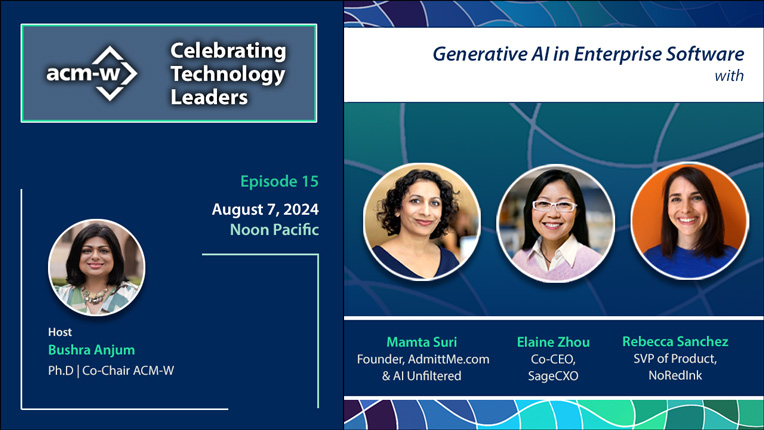
We are at the forefront of a technological revolution where generative AI is redefining the boundaries of what's possible within enterprise environments. Now you can view "Generative AI in Enterprise Software" with host Bushra Anjum and a panel of experts representing diverse fields—Mamta Suri, Elaine Zhou, and Rebecca Sanchez—as they explore the current trends, challenges, and future prospects of integrating generative AI into enterprise software.
Accessibility in Computing: Trends, Challenges and Opportunities
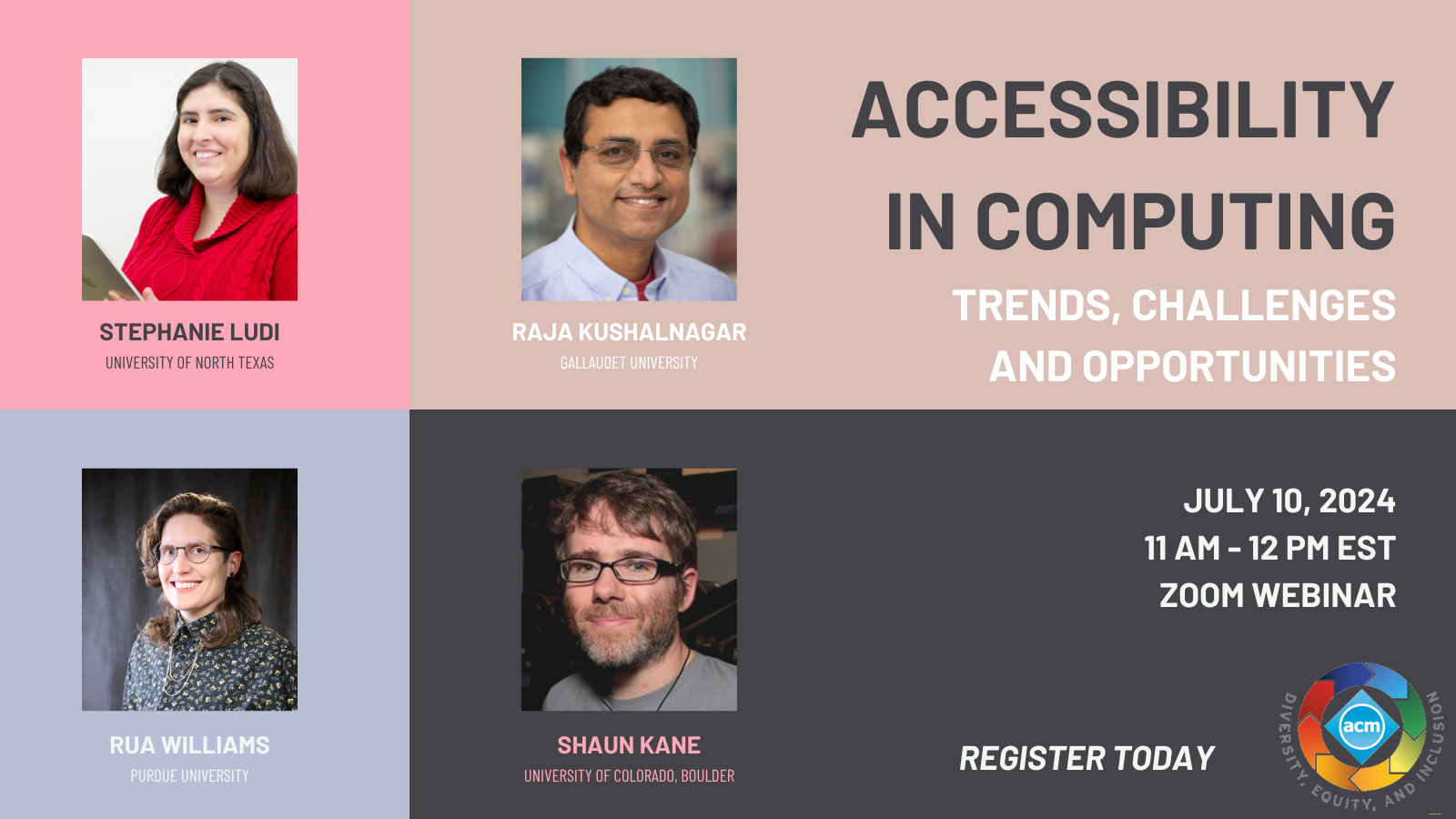
The ever-changing landscape of technology, the computing industry, and resulting societal impacts carry great potential for persons with disabilities. On July 10, 2024, ACM DEI Council hosted the panel, "Accessibility in Computing: Trends, Challenges and Opportunities." Panelists explored a range of topics about the current trends in accessibility in computing and how the industry is incorporating inclusive designs to meet diverse needs. Panelists discussed the gaps in accessibility that technology companies and others should address creating a more inclusive digital space.
How Tech Can Empower the LGBTQ+ Community
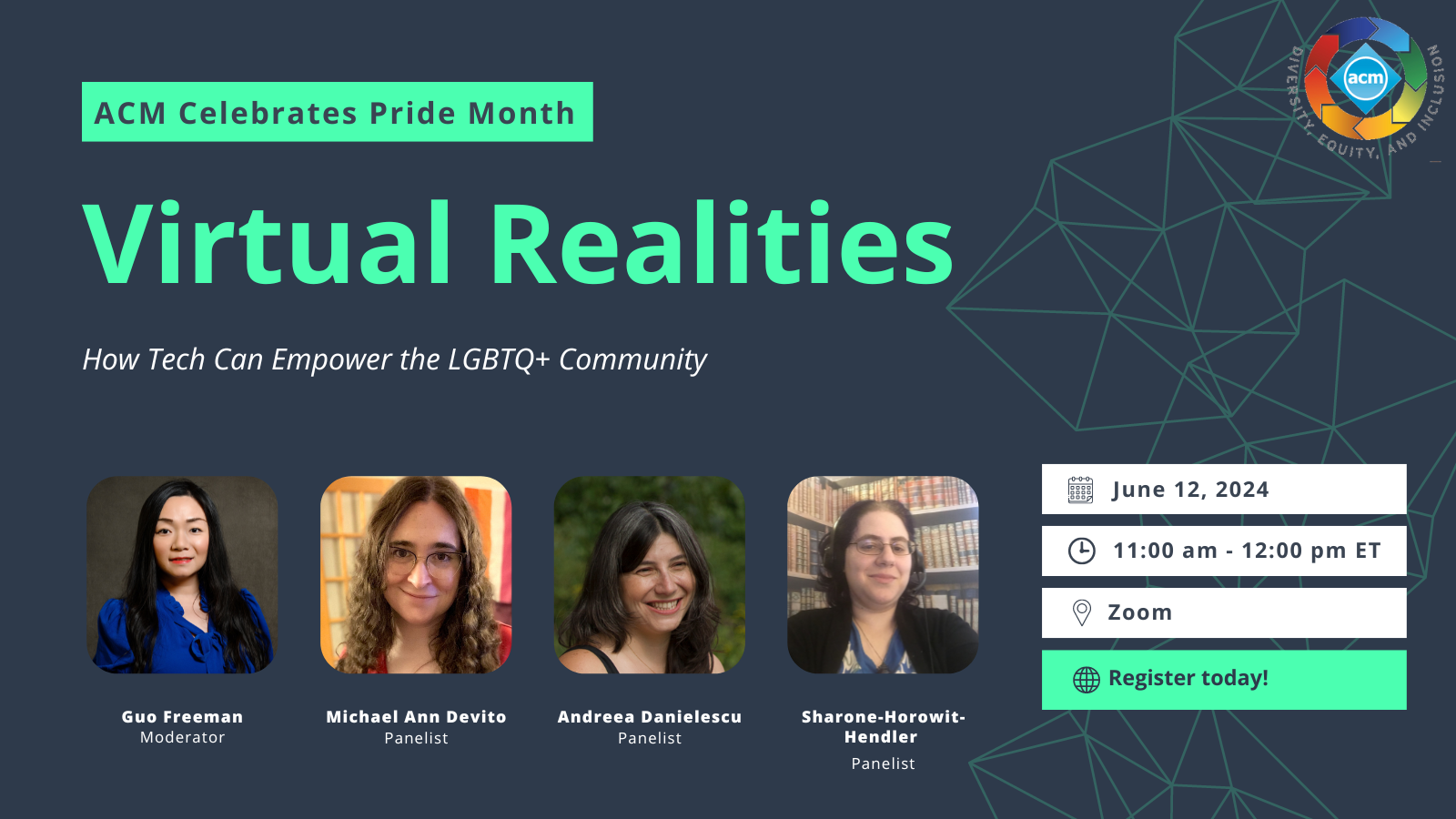
In celebration of Pride Month, ACM hosted a panel discussion centered around technological advances and its importance in connecting LGBTQ+ individuals worldwide. Queer users have utilized virtual reality and social media platforms to create a safe environment for community gathering and authentic self-expression. “Virtual Realities: How Tech Can Empower the LGBTQ+ Community,” featured panelists Andreea Danielescu, Sharone Horowit-Hendler, and Michael Ann Devito with Guo Freeman as the moderator as they shared their research on how LGBTQ+ identities and technology intersect.
MEMBERSHIP
Featured Member Benefit: Help Prepare for the Future: ACM Long Term Care Insurance Program
When it comes to Long-Term Care Insurance, people usually want to know two things: how much does it cost and what does it cover? ACM, in partnership with Long-Term Care Resources (LTCR), offers you an exclusive resource to help answer these questions. LTCRplus can help you prepare for long-term care and protect your retirement assets by offering you exclusive planning tools that include: helping you evaluate and select the right plan for your budget and needs, finding the type of quality care you desire, creating important legal documents related to aging; and helping prepare you for a care situation and ensure the proper care is received. Find out more today and request a free benefit guide about the ACM LTCRplus insurance program. Call 844-582-7587 or visit LCTRplus.
LEARNING PROGRAMS
ACM ByteCast Interviews
ACM ByteCast is a podcast series from ACM’s Practitioner Board in which hosts Rashmi Mohan, Bruke Kifle, and Scott Hanselman interview researchers, practitioners, and innovators who are at the intersection of computing research and practice. In each monthly episode, guests will share their experiences, the lessons they’ve learned, and their own visions for the future of computing. Recent ByteCast interviews include.
- Turing Award laureate Yoshua Bengio, Professor at the University of Montreal and Founder and Scientific Director of MILA (Montreal Institute for Learning Algorithms) at the Quebec AI Institute, traces his path in computing, defines deep learning and talks about knowledge as the relationship between symbols, offers advice for researchers, and shares what he is most excited about with the future of AI.
- ACM Fellow Juan Gilbert, the Andrew Banks Family Preeminence Endowed Professor and Chair of the Computer & Information Science & Engineering Department at the University of Florida, shares his surprise at being nominated for the NMTI, which he received in 2023 from President Joe Biden his lab’s mission to change the world by solving real-world problems, and much more.
- ACM Fellow Ramón Cáceres, a computer science researcher and software engineer, shares how he started in computer engineering but grew more interested in software, how his strong background in hardware helped throughout his scientific and engineering career, looks toward the future of mobile and edge computing in the next 5-10 years, his particular interest in federated machine learning, and more.
Listen to ACM ByteCast interviews here, or wherever you get your podcasts.
Featured TechTalks
ACM members and non-members alike are welcome to attend our popular series of free TechTalks by expert industry professionals, distinguished ACM award laureates, and visionary researchers from industry and academia. Recent TechTalks include.
- In "Understanding the LLM Development Cycle: Building, Training, and Finetuning," Sebastian Raschka, Staff Research Engineer at Lightning AI, guides viewers through the key stages of developing large language models (LLMs), from initial coding to deployment. He will start by explaining how these models are built, including the coding of their architectures, and will provide real examples and encourage questions.
- In "From ML Engineering to AI Engineering," Chip Huyen, bestselling author and Vice President of AI and Open-Source Software at Voltron Data, explores the unique challenges of productionizing foundation models compared to traditional machine learning models. For despite sharing some core principles, foundation models introduce new complexities due to their open-ended nature, advanced capabilities, and computational demands.
Find our entire archive of TechTalks here.
STUDENT NEWS
2024 SRC Grand Final Winners
The ACM Student Research Competition (SRC) has announced its Grand Finals winners. The SRC Grand Finals are the culmination of a year-long competition that involved more than 323 computer science students presenting research projects at 21 major ACM conferences.
Graduate Category:
- First Place: Stefan Klessinger, University of Passau, "Capturing Data-inherent Dependencies in JSON Schema Extraction" (SIGMOD/PODS 2023)
- Second Place: Zhewen Pan, University of Wisconsin - Madison, "The XOR Cache: A Catalyst for Compression" (SIGMICRO 2023)
- Third Place: Chengjie Lu, Simula Research Laboratory, "Test Scenario Generation for Autonomous Driving Systems with Reinforcement Learning" (ICSE 2023)
Undergraduate Category:
- First Place: Jakub Bachurski, University of Cambridge, "Embedding Pointful Array Programming in Python" (POPL 2024)
- Second Place: Amar Shah, University of California, Berkeley, "An Eager SMT Solver for Algebraic Data Type Queries" (PLDI 2023)
- Third Place: Rhett Olson, University of Minnesota, "An Automatic Approach to Finding Geographic Name Changes on Historical Maps" (Sigspatial 2023)
Upcoming ACM Student Research Competitions: Submission Deadlines
ACM Student Research Competitions (SRCs) offer a unique forum for undergraduate and graduate students to present their original research at well-known ACM-sponsored and co-sponsored conferences before a panel of judges and attendees. The most recent SRC winners were presented at FSE 2024. The next conferences accepting submissions are:
- ICSE 2025, April 6–May 4, 2025, deadline November 17, 2024
- SIGCSE 2025, February 26–March 1, 2025, deadline October 14, 2024
- SAC 2025, March 31–April 4, 2025, deadline September 20, 2024
Welcome New ACM Chapters
Chapters are the "local neighborhoods" of ACM. The regional ACM Professional, Student, ACM-W, and Special Interest Group (SIG) chapters around the globe involve members locally in competitions, seminars, lectures, workshops, and networking opportunities. 20 Student and 10 Professional Chapters were started in Australia, China, Comoros, Greece, India, Kenya, Pakistan, Saudi Arabia, Singapore, South Africa, Vietnam, the United Arab Emirates, and the Unites States.
ACM welcomes the new chapters that were chartered April 24, 2024 through July 25, 2024.
Submitting ACM Annual Report
ACM's fiscal year is coming to a close, which means it is time to submit your ACM Annual Report. The report is for the fiscal year 2024 (July 1, 2023 - June 30, 2024) and is due by August 31, 2024.
To complete the report online, you must log in with your unique chapter web account. Please note, your chapter web account is entirely separate from your personal web account and should be accessible to all officers: http://www.acm.org/chapters/chapters/interface.
If you are unsure of your chapter web account or need to reset the password, please use the following link: https://www.acm.org/chapters/web-account-links.
If you have any questions or need assistance, please contact us.
DISTINGUISHED SPEAKERS PROGRAM
ACM Distinguished Speaker: Rizwan Ahmed
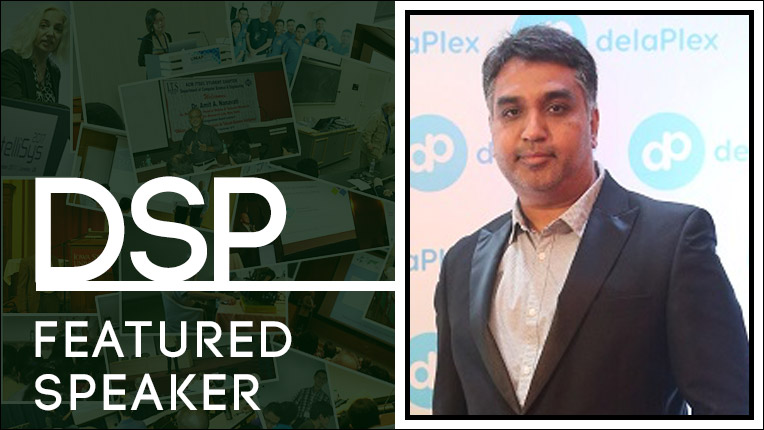
Rizwan Ahmed is Chief Technology Officer (CTO) at delaPlex. He is a Professional Member of ACM and actively involved in various activities of ACM Nagpur Chapter. Ahmed has over 18 years of professional experience in IT industry in various roles as an innovative, hands-on technology executive with a proven track record of leading the design, development & program/project management of high technology projects and solutions. His lectures include "Agile Project Management," "Artificial Intelligence: Opportunities & Threats," and more. For more information about Ahmed, please visit his DSP speaker information page.
All speakers are available through ACM's ACM Distinguished Speaker Program.
SOCIAL MEDIA
ACM Coffee Break Puzzles
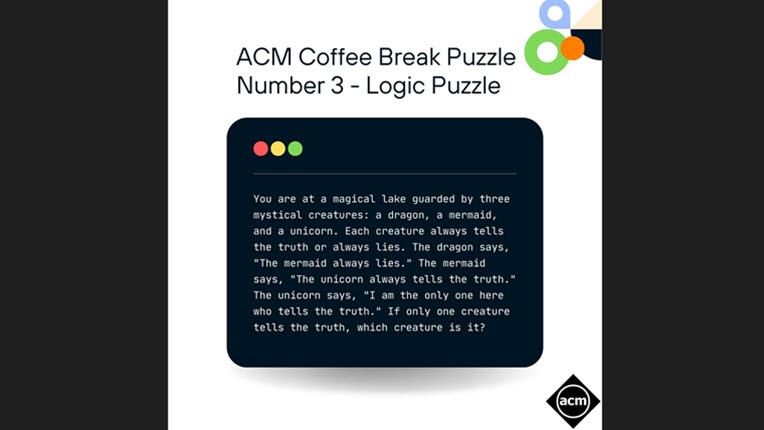
Need a break from the daily grind? Introducing ACM Coffee Break Puzzles! Join us for a puzzle and give your mind a refresh. Follow us on Instagram @theofficialacm and write your solution in the comments!
ACM CAREER & JOB CENTER
The Ultimate Career Development Destination
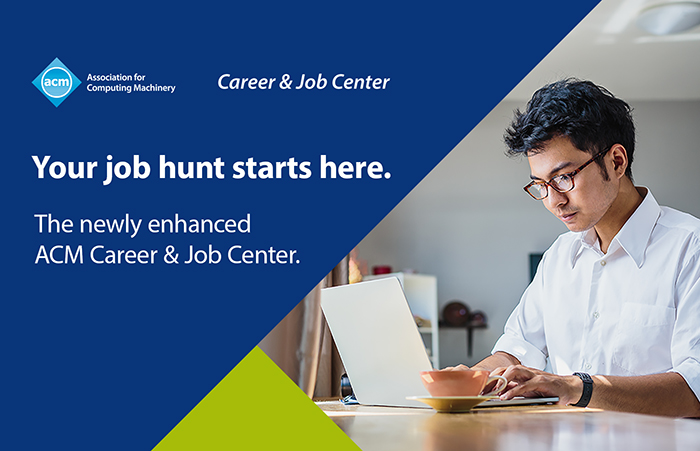
Connecting with the right employers in computing can be a daunting task. The ACM Career & Job Center is a true career planning destination. Whether you are seeking Career Insights, Career Advice, or Career Coaching, ACM can help.
Read past issues of MemberNet online in our archive.
Is there a person, event, or issue you'd like to see covered? Please email [email protected].